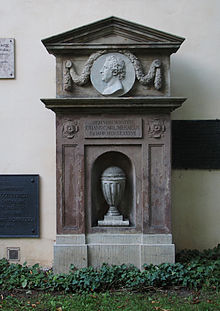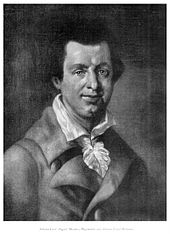Johann Karl August Musäus

Johann Karl August Musäus (born March 29, 1735 in Jena , † October 28, 1787 in Weimar ) was a German philologist , writer and literary critic of the Enlightenment , who was best known as a collector of fairy tales and as a satirical as well as folk narrator .
Life
Johann Karl August Musäus was born on March 29, 1735 as the only son of the commissioner and district judge Johann Christoph Musäus (1697–1764) and his wife Wilhelmine Julia Streit (* 1712) in Jena. At the age of nine he came to his uncle in Allstedt , who raised him strictly according to Christian values. After a few years, both moved to Eisenach because Musäus' father got a job there as a judicial and senior magistrate. At the University of Jena he first studied theology from 1754 to 1758 and then turned to classical philology , as he was not allowed to accept the pastor's position in Farnroda near Eisenach due to certain church misconduct .
In 1763 Musäus got a job as a page master in Weimar and three years later took up a literary critical activity as an employee of the General German Library edited by the enlightened Friedrich Nicolai . There he reviewed around 350 contemporary novels according to the standards of an enlightened art theory based on ancient rhetoric . In 1769 he was appointed professor of classical language and history at the Weimar Wilhelm-Ernst-Gymnasium by Anna Amalie , the Duchess of Saxe-Weimar-Eisenach . At this school he also taught his nephew August von Kotzebue , who later also became famous as a writer.
The following year he married Juliane Krüger (1743-1819), who later gave him two sons, Karl (1772-1831) and August († Jung). He had secured his livelihood by being a professor and writing. From then on, Musäus led a comfortable life away from the court and the center of Weimar Classicism with its main actors. He was a critic of the cult of genius and sensitivity . From 1776 he was a Freemason as a member of the Anna Amalia Lodge for the Three Roses in Weimar. He spent a lot of time in his summer cottage with a garden and kept records of his stays there in the last years of his life. There he received and cultivated friendly relationships with the great intellectuals of his time, including Duke Karl August , Friedrich Justin Bertuch , Gottfried August Bürger , Johann Gottfried Herder , Johann Kaspar Lavater , Nicolai, Corona Schröter and, last but not least, Christoph Martin Wieland , who after the death of Musäus re-edited his successful fairy tale collection “Folk Tales of the Germans”, which saw many editions and translations. In 1783 he was accepted into the Illuminati Order as a so-called presbyter under the name " Dante Alighieri / Priscillan".
He died on October 28, 1787 in Weimar of a polyp in the heart. Johann Gottfried Herder gave a commemorative speech on October 30, 1787. Musäus found his final resting place in the Jacobsfriedhof in Weimar. Musäus' estate was published in 1791 by Kotzebue under the title "Nachgelassene Schriften".
Musäus' home on Kegelplatz in Weimar is used by the Albert Schweitzer Foundation, which maintains a museum there. A regular school in Weimar bore his name until it was closed in 2017.
Works
- Grandison the Second, or History of the Lord of N *** . 1760–1762, three-volume epistolary novel , which parodies the sentimental novel History of Sir Charles Grandison by Samuel Richardson (initially published anonymously). on-line
- The gardener girl from Vincennes . 1771, libretto that u. a. is implemented in an opera by the composers Franz Andreas Holly and Ernst Wilhelm Wolf (1774)
- Physiognomic journeys . 1778/1779, satirical novel directed against Johann Kaspar Lavater and his physiognomic teachings, the genius cult of Sturm und Drang , superstition and obscurantism . Volume 1 online , Volume 2 , Volume 3 , Volume 4
- The German Grandison, also a family story . 1781/1782, two-volume revision of his Grandison novel published in 1762. Volume 1 online , Volume 2
-
Folk tales of the Germans . 1782–1786: Collection of fairy tales (better: art fairy tales ), legends and sagas in five volumes that combine folk (but literary!) And satirical elements
- Volume 1: The books of the chronicle of the three sisters , Richilde , Roland's squires
- Volume 2: Legends of Rübezahl , The Nymph of the Well
- Volume 3: Libussa , The Robbed Veil , Loyalty to Love
- Volume 4: Mute love , Ulrich with the Bühel , the demon Amor
- Volume 5: Melechsala , The Treasure Digger , The Abduction
- Folk tales of the Germans. With woodcuts based on original drawings. - Leipzig: Mayer and Wigand, 1842. Digitized edition of the University and State Library Düsseldorf
- Friend Hein's apparitions in Holbein's manner . 1785, Modern Dance of Death in prose . on-line
- Ostrich feathers . 1787, the first volume in a collection of short stories that remains unfinished due to his untimely death. on-line
- Moral children's rattles for children and non-children . 1794, instruction book for children. It is a free adaptation of the work "Hochets moraux" published in 1782, written by the French Monget. Remaining a fragment due to Musäus' death, his friend Bertuch gathers the remains of the book and publishes them. on-line
Honors
The main belt asteroid (10749) Musäus , discovered in 1989, was named after him.
literature
- Franz Muncker : Karl Musäus . In: Allgemeine Deutsche Biographie (ADB). Volume 23, Duncker & Humblot, Leipzig 1886, pp. 85-90.
- Hans Peter Neureuter: Musäus, Johann Karl August. In: New German Biography (NDB). Volume 18, Duncker & Humblot, Berlin 1997, ISBN 3-428-00199-0 , p. 623 f. ( Digitized version ).
- Rita Seifert: Johann Carl August Musäus - writer and educator of the Enlightenment , Weimarer Taschenbuch Verlag, Weimar 2008, 128 p., With numerous. Fig., ISBN 978-3-939964-06-3
- Werner Wilhelm Schnabel: From the pretty maid and the gentleman in the house. On the poetological definition of the 'folk tale' in Johann Carl August Musäus . In: Ernst Rohmer / Werner Wilhelm Schnabel / Gunther Witting (eds.): Texts, Images, Contexts. Interdisciplinary contributions to literature, art and modern aesthetics . Heidelberg 2000 (Beihefte zum Euphorion, 36), pp. 149–179.
Web links
- Literature by and about Johann Karl August Musäus in the catalog of the German National Library
- Works by and about Johann Karl August Musäus in the German Digital Library
- Works by Johann Karl August Musäus at Zeno.org .
- Works by Johann Karl August Musäus in the Gutenberg-DE project
- Musäus on the Internet Archive
- Musäus: Fourth legend by Rübezahl. With illustration by Ludwig Richter
- Johann Karl August Musäus: Chronicle of the three sisters. Text and illustrations
- JR Schellenberg and JKAugust Musäus: Freund Hein's apparitions in Holbein's manner (dance of death)
- The Musäus grave Last rest on the Jakobskirchhof
Individual evidence
| personal data | |
|---|---|
| SURNAME | Musäus, Johann Karl August |
| BRIEF DESCRIPTION | German writer and literary critic |
| DATE OF BIRTH | March 29, 1735 |
| PLACE OF BIRTH | Jena |
| DATE OF DEATH | October 28, 1787 |
| Place of death | Weimar |


